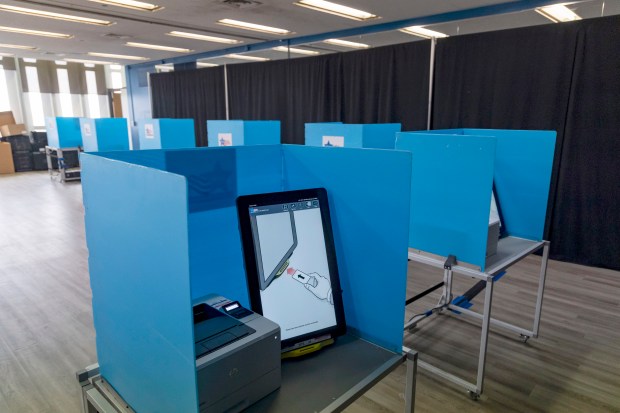Cook County voters are staring down more than a dozen referendums to raise taxes in the March 19 primary, including the Bring Chicago Home question championed by Mayor Brandon Johnson.
But if recent history is any indication, very few residents will decide the outcome.
A new report from Cook County Treasurer Maria Pappas — whose office mails out property tax bills — found that in 75 binding property tax-related referendums put on ballots between 2020 and 2023, the average turnout was 32% of all registered voters. That number always fell below the overall election turnout, meaning that some voters skipped those questions entirely. In all, 70% of the referendums were approved.
“Those who did vote decided whether to increase taxes, issue new debt, create or dissolve taxing districts, and grant or eliminate powers that allow their municipal governments to enact a broader array of taxes,” the report said.
Those yes votes gave various taxing bodies like school and park districts, cities and villages and other local governments the power to issue bonds creating $1.16 billion in new debt and exceed caps on property tax levy increases by more than $59 million, the report found.
Pappas’ office also compiles data on debts attributable to various taxing bodies; Pappas has argued more voter awareness and participation would tamp down fiscal irresponsibility.
“Voters are given the power to make these key decisions, but most don’t bother to vote,” Pappas said in a statement. “And when their taxes go up, they are the first to complain.”
There are 13 property tax-related referendums on ballots across the county in the Mar. 19 primary:
- Five asking voters to issue new bonds for Avoca School District 37, Hanover Park District, Lemont Park District, Union Ridge School District 86, and the village of Kenilworth;
- Four to exceed so-called PTELL limits on property tax rates for the Northlake Public Library, Palos Community Consolidated School District 118, Prospect Heights School District 23 and Robbins Park District;
- Two to grant home rule authority for the villages of Richton Park and Roselle, which would give those municipalities more flexibility to raise taxes;
- One to dissolve the Elk Grove Rural Fire Department;
- One to raise one-time taxes on property sales in Chicago, the Bring Chicago Home referendum.
In the last three years, consolidated elections — those held in odd years, which are often focused on local issues — saw the lowest average turnout for referendums, with less than 19% voting on referendums. Primary elections, like the one coming up next week, garnered just over 25%, while general contests like the upcoming November election saw about 48% turnout.
Despite the major impact of such votes — on whether to stop or start up a fire department, build a new school or provide mental health services — just 12% of the referendums in that span drew more than half of registered voters to the polls, and 47% were decided by less than a quarter of voters.
At times, referendums “were decided by exceedingly slim margins,” such as in Hometown, where a 2022 primary vote to give officials home rule powers passed by two votes, 381-379. Overall turnout was 27%. A vote to create a park district in University Park failed, thanks to an 815-815 tie. While 3,020 voters cast their ballots in University Park in that November 2022 election, only 1,630 voted on the referendum — less than 22%.
The report identifies other cases of voters casting ballots but skipping referendums. It’s not uncommon for voters to focus on main-event races and ignore down-ballot contests, but the report identified a few extreme cases.
That includes a $16.5 million bond issuance for the Long Grove Fire Protection District saw a 68% drop-off: 2,540 ballots were cast in the district, but fewer than 800 of those people voted on the referendum. A vote to raise taxes for mental health in West Town and Humboldt Park in Chicago saw a drop-off of nearly 11,000 votes in the 2022 general election.
Recent history show primary races correspond with a higher passing rate for referendums — at 83% — compared with about 68% in general elections and 61% in consolidated elections, which may be good news for backers of the Bring Chicago Home referendum and local governments seeking tax hikes or powers.
“The combination of low turnout and the focus on state and federal issues may give a group of voters supporting the referendums an advantage,” the report notes, but cautions that other factors can play into whether ballot questions succeed or fail. “What is clear is that low voter turnout often gives an advantage to highly engaged groups of voters who back referendum questions.”



